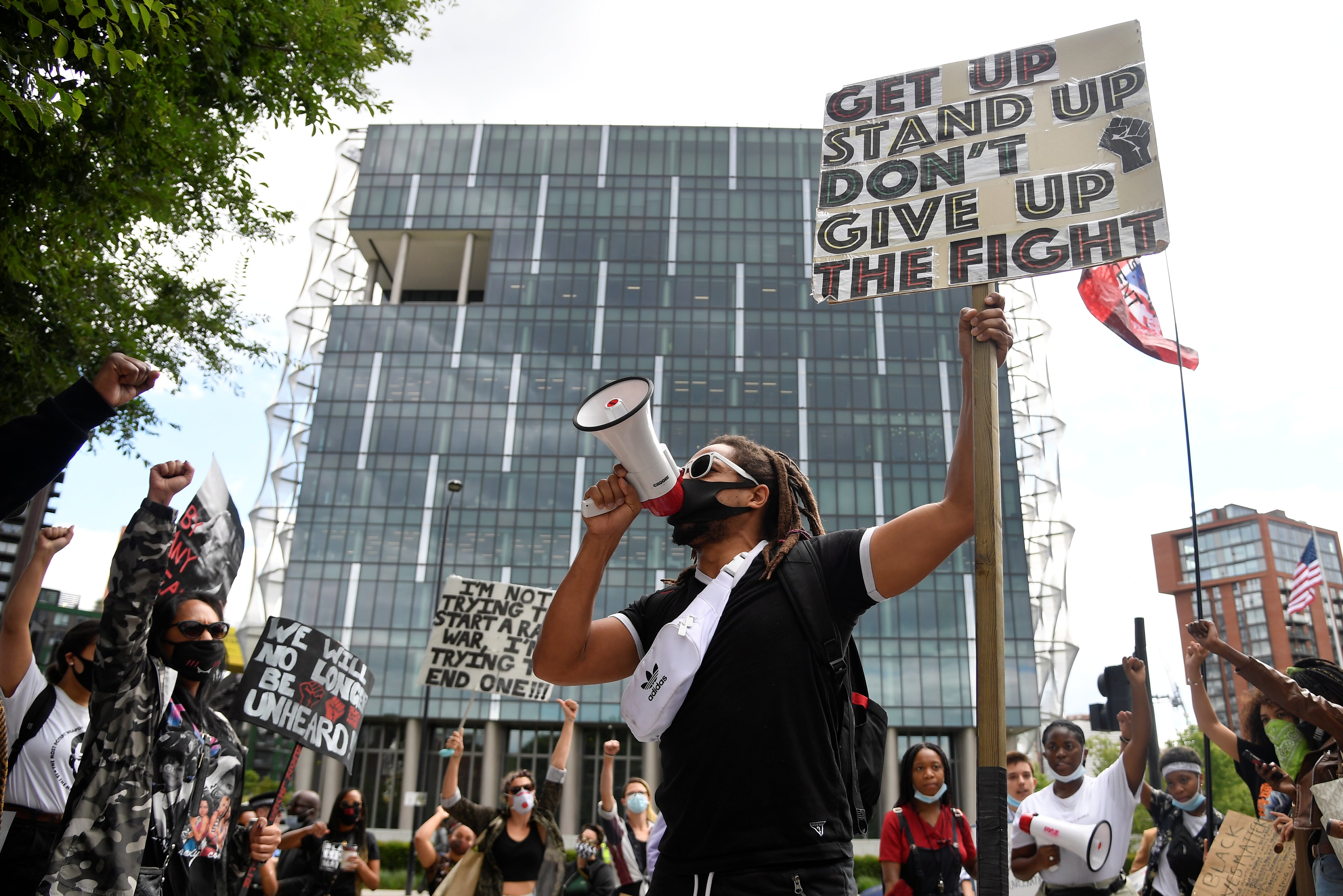How accurate is the claim Britain is not structurally racist?
Shaun Lintern, May Bulman, Adam Forrest, Tom Batchelor, Maya Oppenheim and Zoe Tidman consider how racism still permeates various aspects of public life


The UK is no longer a country where the “system is deliberately rigged against ethnic minorities”, according to a landmark report into race in modern Britain.
The Commission on Race and Ethnic Disparities said other factors, including family influence and socio-economic background, impact life chances more than racism.
While there is still “overt” racism in the UK, the report concluded, claims that it is still institutionally racist were not borne out by the evidence.
However, activists, academics and politicians appeared united in their opposition to the report’s overarching conclusion.
They say it amounts to a whitewash that wishes racism away, rather than acknowledging and addressing the problem.
Read more:
Here, Independent correspondents consider how the issue still permeates various aspects of public life.
Health
There are acknowledged health inequalities between different ethnic groups throughout the UK and disparities in health outcomes have been put under the spotlight during the coronavirus pandemic, writes Shaun Lintern.
During the first wave of the virus, black men were more than three times more likely to die that white men. There were also higher risks for other ethnic groups. The differences are likely to be linked to multiple factors including the type of work people do, the areas they live in and existing health problems when they’re infected.
Away from Covid, one of the starkest health inequalities is in maternity, where black women are four times more likely to die giving birth than white women.
Earlier this year, The King’s Fund think tank found people from ethnic minority groups were more likely to report being in poorer health and to report poorer experiences of using health services than white people.
The reasons for health inequalities are linked to deprivation and what are called the wider determinants of health like education, employment and lifestyle.
The King’s Fund said ethnic minorities are disproportionately affected by deprivation, adding: “This is driven by a wider social context in which structural racism can reinforce inequalities among ethnic groups, for example in housing, employment and the criminal justice system, which in turn can have a negative impact on their health.”
Criminal justice
When it comes to the criminal justice system, the racial disparities are clear to see – and there’s little to suggest things are improving, writes May Bulman.
In September 2017, Labour MP David Lammy published a hard-hitting assessment of institutional racism within the justice system, uncovering disproportionality at every stage from prosecution through to sentencing and resettlement.
To cite just a few statistics, more than a quarter (27 per cent) of people in prison are from a minority ethnic group, despite making up 14 per cent of the total population in England and Wales.
People of colour are also considerably more likely to be sent to prison for an indictable offence at the Crown Court, with the proportion 53 per cent higher for black people than the general population, 55 per cent higher for Asian and 81 per cent higher for other ethnic minority groups - even when factoring in higher not-guilty plea rates.
The Ministry of Justice accepted all 35 of the recommendations in the Lammy review. In February 2020, ministers published an update on progress in implementing them – but did not include an assessment of the impact of any of this work. Meanwhile, the proportion of the youth custody population who came from ethnic minority backgrounds had increased.
Worse still, campaigners warn that work towards attaining racial equality in the criminal justice system has actually regressed in recent years, and that outcomes for people of colour are only likely to worsen given proposals contained in the government’s Police, Crime, Sentencing and Courts (PCSC) Bill.
Indeed, the government’s own equality statement of the Bill acknowledges that the proposal to abolish the automatic halfway release point for certain serious offenders will have a disproportionate impact on “people with a black or black British ethnicity”. Yet it falls short of describing the impact on these individuals or explaining the reasons for the disparities.
Needless to say, institutional racism in the criminal justice system persists.
Politics
A majority of ethnic minority MPs have experienced racism or racial profiling at Westminster, a major survey found last year,writes Adam Forrest. Some 62 per cent of MPs from minority ethnic backgrounds said they had experienced racism on the parliamentary estate.
The Conservative party has been dogged by claims it has failed to face up to its problem with Islamophobia – with a dossier of more than 300 allegations of anti-Muslim racism in the party was submitted to the Equalities and Human Rights Commission (EHRC) in 2020.
Boris Johnson was criticised for dropping a Tory promise to hold an independent inquiry into Islamophobia within his party in 2019, and the EHRC condemned for failing to carry out an independent investigation last year.
This week’s poll by BMG Research for The Independent found that almost a third (31 per cent) of ethnic minority respondents think the Conservative party is racist. By contrast, only 20 per cent of all Britons believe the party is racist – suggesting a significant difference in perspectives stemming from different life experiences.
Labour, meanwhile, has struggled to overcome its problem with antisemitism in recent years. The party published its new plan for handling prejudice against Jews in December after a highly critical report from the EHRC.
The body found since the party broke equality law under Jeremy Corbyn’s leadership as party agents used “antisemitic tropes” and suggested that complaints of antisemitism were fake. Keir Starmer said tackling antisemitism was “our number one priority”, and has promised to establish an independent complaints process later in 2021.
Gender
From childbirth mortality rates to online abuse, wages, and domestic violence, the data speaks for itself when you look at stark inequalities faced by black women living in Britain, writes Maya Oppenheim.
Previous research by leading gender equality charity Fawcett Society found the under-representation of women in politics, law, trade unions, the civil service, charities, professional institutions and sports bodies is “consistent and persistent” – finding gender equality was “alarmingly” worse for women of colour who are completely absent from senior positions in many sectors.
Recent research found black women are the least likely section of society to be among the top earners in the UK. On top of this, women of colour are already two times more likely to be arrested than white women, while after being convicted black women are 25 per cent more likely to be handed a custodial sentence than white women.
Women of colour also suffer higher rates of domestic homicide – with research from 2019 showing women with mixed ethnicities were 10 per cent more likely to have endured partner abuse in the last year than any other ethnic group.
Irrespective of this troubling disparity, time and time again it is specialist services for survivors of domestic violence from ethnic minorities which have been hardest hit by austerity measures as government funding has instead moved towards generic service providers.
While studies have also found that female MPs of colour are subjected to far more abuse online than their white peers – with a study by Amnesty International discovering black female MPs and journalists were 84 per cent more likely to be mentioned in abusive tweets than white women.
Women from ethnic minority backgrounds are also far more likely to die while pregnant or during childbirth – with previous research noting that black women are five times more likely to die during pregnancy or childbirth than white women, and Asian women are nearly twice as likely.
The term misogynoir can go some way to explaining some of these issues. While misogyny is characterised by the hatred of women, misogynoir describes the racist miosgyny which black women are routinely forced to endure throughout their lives.
Media
When it comes to the media landscape, non-white Britons are underrepresented across the board, writes Tom Batchelor.
In TV, research by Equity found that not only are ethnic minorities often missing from peak-time scripted programming, but depictions of African-Caribbean and south Asian characters often reinforce outdated and damaging stereotypes.
The study, published last April, analysed 53 weeks of primetime scripted drama and comedy shows broadcast on UK terrestrial television. It found just 8 per cent of lead roles were played by actors of African-Caribbean, south Asian, east Asian or Middle Eastern heritage.
It noted stereotypes were reinforced through the depiction of Middle Eastern and south Asian characters in narratives about terrorism, and African-Caribbean people in narratives about criminaity.
The situation is not much better among news outlets. A Reuters Institute study released this month found that none of the UK news providers in their sample had a non-white top editor.
The report said industry bodies had vow to tackle the problem as far back as 2004. “Seventeen years later, it is not clear that the profile of top editors is significantly more diverse in terms of race than it was then,” the report concluded. “Change and turnover at the top is often slow, and even when it happens it does not always result in greater diversity.”
Read more:
Added to that are accusations of racism within UK newspaper reportage. Recent criticism, primarily targeted at the tabloid press, has centred on the coverage of Meghan Markle. Prince Harry said racism from parts of the UK media played a “large part” in the couple’s decision to leave the UK.
In 2016, the European Commission against Racism and Intolerance (ECRI) took aim at some British media outlets for “offensive, discriminatory and provocative terminology”.
Its report said hate speech was a serious problem, including against Roma, gypsies and travellers, as well as “unscrupulous press reporting” targeting the LGBT+ community.
The report concluded that some reporting on immigration, terrorism and the refugee crisis was “contributing to creating an atmosphere of hostility and rejection”.
It cited Katie Hopkins’ infamous column in The Sun, where she likened refugees to “cockroaches”, and the same newspaper’s debunked claim over “1 in 5 Brit Muslims’ sympathy for jihadis”.
Education
Lots of focus on education has been on the academic underperformance of white working class children - which the schools minister put down to poverty last month.
However, divides in education do not stop there, writes Zoe Tidman.
At university, the attainment gap between white and black graduates “remains far too high”, according to England’s higher education regulator, who found black students were still less likely to obtain top degrees in the last academic year.
Back in 2019, a vice-chancellor warned “a generation of students” would be failed if universities did not act immediately to reduce the ethnic minority attainment gap, as they were told to improve representations in curriculums and have more open conversations around race.
And last year, a vice-chancellor said UK institutions “perpetuate institutional racism”, as guidance told them to improve understanding of racial harassment and microaggressions.
Meanwhile for younger children, data has raised concerns over those from certain ethnic minorities being disproportionately excluded from school. The permanent exclusion rate for Gypsy and Roma, Irish traveller and black Caribbean children was at least double that for all students in England over the 2018-2019 academic year, when the latest government data is from.
Schools have also faced accusations of unfairly punishing black students for hairstyles and “kissing teeth” due to racial bias.
Join our commenting forum
Join thought-provoking conversations, follow other Independent readers and see their replies
Comments